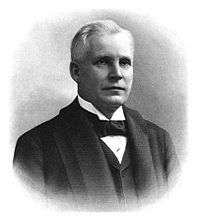William Henry Eustis
William Henry Eustis (1845 – November 30, 1928) was the 17th mayor of Minneapolis, Republican nominee for Governor of Minnesota in 1898, and a philanthropist.[1]
William Henry Eustis | |
|---|---|
 | |
| 17th Mayor of Minneapolis | |
| In office January 2, 1893 – January 7, 1895 | |
| Preceded by | Phillip B. Winston |
| Succeeded by | Robert Pratt |
| Personal details | |
| Born | July 17, 1845 Oxbow, New York |
| Died | November 30, 1926 (aged 81) Minneapolis, Minnesota |
| Resting place | Lakewood Cemetery 44°56′11″N 93°17′56″W |
| Political party | Republican |
| Mother | Mary Marwick |
| Father | Tobias Eustis |
| Education | Bachelor of Laws |
| Alma mater | Wesleyan University Columbia Law School |
| Profession | Attorney Business magnate |
| Known for | Philanthropist |
Biography
Eustis was born in Jefferson County, New York on July 17, 1847. When he was 15 years old, he contracted a hip disease, which required him to walk with a cane and then with crutches. Eustis graduated from Wesleyan University in Connecticut in 1873 and then got his law degree from Columbia Law School the next year. He moved to Minneapolis in 1881 and started dealing in real estate, becoming more well known as an owner of downtown buildings than as an attorney. He served as the mayor of Minneapolis for one term, 1893 through 1895.[2][3]
Later in life, he began to think about donating much of his wealth to charity, facetiously calling it "mostly unearned increment."
In 1923, he bought 65 acres (26 ha) of land on the west side of the Mississippi River and donated 21 acres (8.5 ha) to the Minneapolis School Board for the site of the Michael Dowling School, devoted to the education of handicapped children. He subsequently donated the remaining 44 acres (18 ha) of land, along with $900,000 in securities, to the University of Minnesota for a hospital and convalescent home. He did not want the hospital to bear his name, instead preferring it to be called the "Minnesota Hospital and Home for Crippled Children."
Eustis eventually donated his interest in the Flour Exchange Building and Corn Exchange Building to the university, along with the rental income. Hospital construction began on November 10, 1928, but by that time he was too ill to attend. Eustis died of heart disease on November 30, 1928.[2] The hospital included an outpatient department, two floors of rooms for inpatient treatment, space for an on-site school, and an amphitheater for teaching purposes. The university eventually named the hospital after Eustis to recognize his generosity.[4]
When the Mayo Memorial Building on campus was completed in 1954, the Eustis Hospital, along with Elliot Hospital, were incorporated into the structure.[4]
Electoral history
- Minneapolis Mayoral Election, 1892
- William H. Eustis 17,910
- James C. Haynes 15,728
- Charles M. Way 1,842
- Theodore F. Stark 1,665
References
- "W.H. Eustis Dies. A Philanthropist. A Cripple From Boyhood, He Realized Dream Of Helping Other Unfortunates. Built Hospital And Home He Served As Mayor Of Minneapolis and Earned The Money For His Education. First Step To Fulfill Dream. Worked To Obtain Education". New York Times. November 30, 1928. Retrieved 2009-08-27.
William Henry Eustis, former Mayor of Minneapolis, Republican nominee for Governor of Minnesota, in 1898 and philanthropist, died here today at the age of 83. Mr. Eustis never married. He is survived by a brother.
- Folwell, William Watts (1930). A History of Minnesota. 4. Minnesota Historical Society Press. ISBN 978-0-87351-490-3.
- "Career of William H. Eustis". Minnesota Election Trends Project.
- Moore, Erik (October 4, 2007). "Academic Health Center Archives: Eustis Hospital". Retrieved 2009-08-27.
| Party political offices | ||
|---|---|---|
| Preceded by David Marston Clough |
Republican nominee for Governor of Minnesota 1898 |
Succeeded by Samuel Rinnah Van Sant |
| Political offices | ||
| Preceded by Phillip B. Winston |
Mayor of Minneapolis 1893 – 1895 |
Succeeded by Robert Pratt |